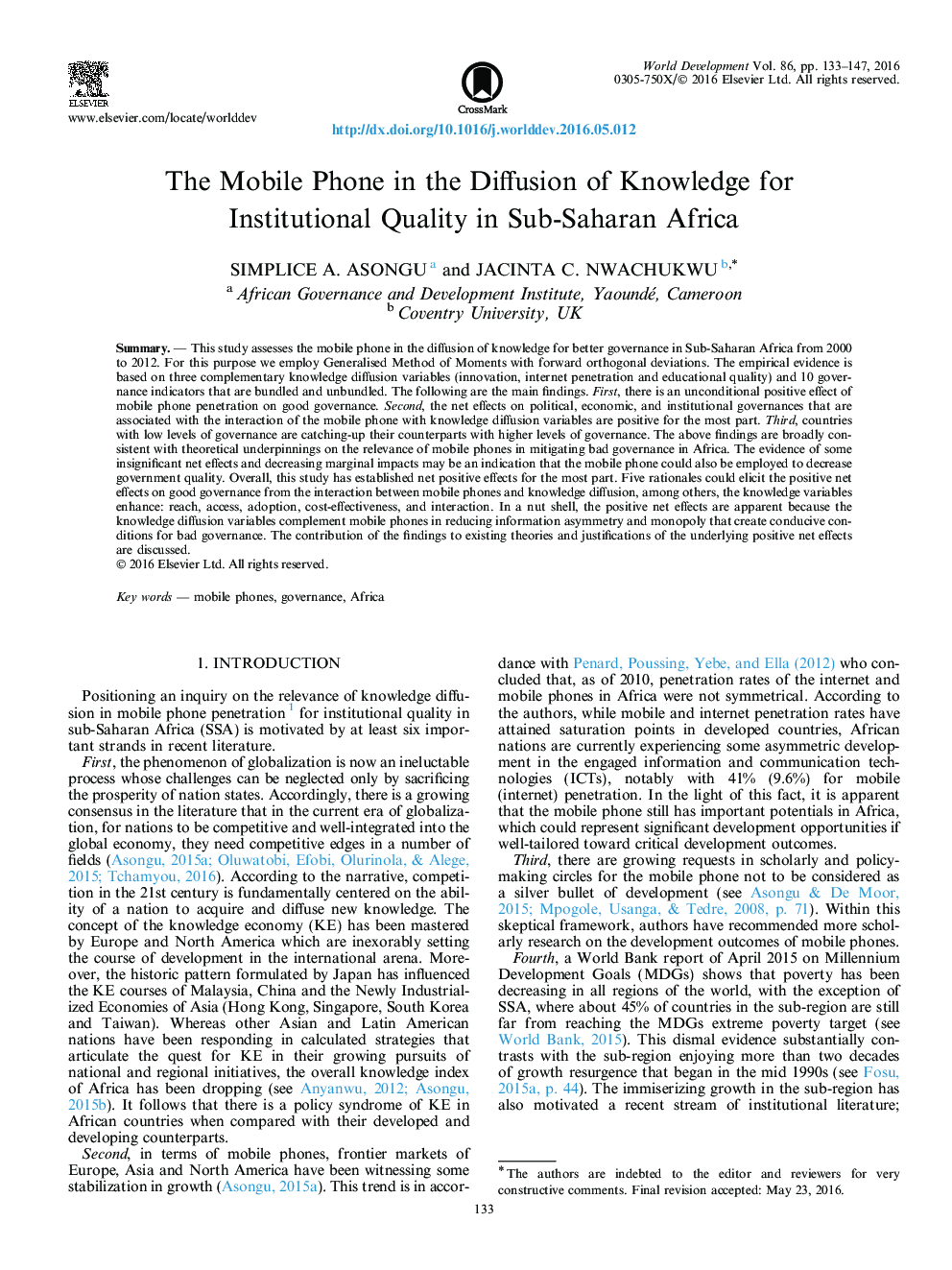| کد مقاله | کد نشریه | سال انتشار | مقاله انگلیسی | نسخه تمام متن |
|---|---|---|---|---|
| 7392491 | 1481132 | 2016 | 15 صفحه PDF | دانلود رایگان |
عنوان انگلیسی مقاله ISI
The Mobile Phone in the Diffusion of Knowledge for Institutional Quality in Sub-Saharan Africa
ترجمه فارسی عنوان
تلفن همراه در انتشار دانش برای کیفیت سازمانی در کشورهای جنوب صحرای آفریقا
دانلود مقاله + سفارش ترجمه
دانلود مقاله ISI انگلیسی
رایگان برای ایرانیان
کلمات کلیدی
تلفن های همراه، حکومت، آفریقا،
ترجمه چکیده
این مطالعه تلفن همراه را در انتشار دانش برای حکومتداری بهتر در کشورهای جنوب صحرای آفریقا از سال 2000 تا 2012 ارزیابی می کند. برای این منظور از روش عمومی لحظه ها با انحرافات متقاطع مستقیم استفاده می کنیم. شواهد تجربی بر مبنای سه متغیرهای تکثیر دانش دانش (نوآوری، نفوذ اینترنت و کیفیت آموزشی) و 10 شاخص حاکمیت است که همراه و جداگانه هستند. یافته های اصلی زیر است. اولا، یک اثر مثبت بی قید و شرط از نفوذ تلفن همراه به حکومت خوب وجود دارد. دوم، تاثیرات خالص بر حاکمیت های سیاسی، اقتصادی و سازمانی که با تعامل تلفن همراه با متغیرهای انتشار دانش شناخته می شود، در بیشتر موارد مثبت است. سوم، کشورهایی که سطح پایینی از حکومت دارند، همتایان خود را با سطوح بالاتری از حکومت به دست می آورند. یافته های بالا عموما با مبانی نظری مرتبط بودن ارتباط تلفن های همراه در کاهش رعایت ادب بد در آفریقا مطابقت دارد. شواهد برخی از اثرات خفیف ناچیز و کاهش اثرات حاشیه ای ممکن است نشان دهنده این باشد که تلفن همراه نیز می تواند برای کاهش کیفیت دولت استفاده شود. به طور کلی، این مطالعه بیشترین تأثیرات مثبت خالص را ایجاد می کند. پنج دلیل میتواند تأثیرات مثبت خالص را بر حکومتداری خوب از طریق تعامل بین تلفنهای همراه و انتشار دانش بدست آورد، در عوض، متغیرهای دانش افزایش مییابند: دسترسی، دسترسی، پذیرش، اثربخشی هزینه و تعامل. در یک پوسته مهره، اثرات مثبت خالص آشکار است، زیرا متغیرهای انتشار دانش، تلفن های همراه را در کاهش تقارن اطلاعات و انحصارهایی که باعث ایجاد شرایط مطلوب برای حکومت بد می شوند، تکمیل می کند. مشارکت یافته ها به نظریه های موجود و توجیه اثرات مثبت خالص پایه بحث شده است.
موضوعات مرتبط
علوم انسانی و اجتماعی
اقتصاد، اقتصادسنجی و امور مالی
اقتصاد و اقتصادسنجی
چکیده انگلیسی
This study assesses the mobile phone in the diffusion of knowledge for better governance in Sub-Saharan Africa from 2000 to 2012. For this purpose we employ Generalised Method of Moments with forward orthogonal deviations. The empirical evidence is based on three complementary knowledge diffusion variables (innovation, internet penetration and educational quality) and 10 governance indicators that are bundled and unbundled. The following are the main findings. First, there is an unconditional positive effect of mobile phone penetration on good governance. Second, the net effects on political, economic, and institutional governances that are associated with the interaction of the mobile phone with knowledge diffusion variables are positive for the most part. Third, countries with low levels of governance are catching-up their counterparts with higher levels of governance. The above findings are broadly consistent with theoretical underpinnings on the relevance of mobile phones in mitigating bad governance in Africa. The evidence of some insignificant net effects and decreasing marginal impacts may be an indication that the mobile phone could also be employed to decrease government quality. Overall, this study has established net positive effects for the most part. Five rationales could elicit the positive net effects on good governance from the interaction between mobile phones and knowledge diffusion, among others, the knowledge variables enhance: reach, access, adoption, cost-effectiveness, and interaction. In a nut shell, the positive net effects are apparent because the knowledge diffusion variables complement mobile phones in reducing information asymmetry and monopoly that create conducive conditions for bad governance. The contribution of the findings to existing theories and justifications of the underlying positive net effects are discussed.
ناشر
Database: Elsevier - ScienceDirect (ساینس دایرکت)
Journal: World Development - Volume 86, October 2016, Pages 133-147
Journal: World Development - Volume 86, October 2016, Pages 133-147
نویسندگان
Simplice A. Asongu, Jacinta C. Nwachukwu,
